Starting a hair salon business in Nigeria is an exciting venture, with immense opportunities for growth and success. As the beauty industry continues to flourish, many aspiring entrepreneurs are exploring how to tap into this lucrative market.
But what does it take to open and run a hair salon in Nigeria successfully? What steps are necessary to turn your passion for hair care into a sustainable business? This guide will help answer these questions and provide you with the knowledge needed to start a successful hair salon business in Nigeria.
The hair care industry in Nigeria is vast, with demand for hair services consistently high due to the growing population and cultural significance of hair. From hair braiding and cutting to styling and coloring, Nigerians place great importance on looking their best.
We will walk you through the different processes of starting a hair salon business in Nigeria. We will explore everything from conducting market research and crafting a business plan to selecting the right location and setting up your salon. So, if you’ve been wondering how to begin your journey in the Nigerian hair salon business, this guide is for you.
Here is an Overview of the Hair Salon Industry in Nigeria
The hair salon industry in Nigeria is not only thriving but also continuously evolving, driven by changing consumer demands and cultural trends. Nigerian women, and increasingly men, are known for maintaining their hair and embracing new hairstyles that fit their style. The market is vast, spanning across various segments, from budget-friendly services to high-end, luxury hair salons. This diversity presents both a challenge and an opportunity for business owners.
The growth of the Nigerian middle class has further fueled the demand for premium hair care services, while the popularity of protective styles like braids, weaves, and wigs continues to increase. With the rise of social media influencers and celebrities promoting beauty trends, the Nigerian hair care industry shows no signs of slowing down. This provides excellent prospects for anyone looking to break into the business and serve a wide range of customers.
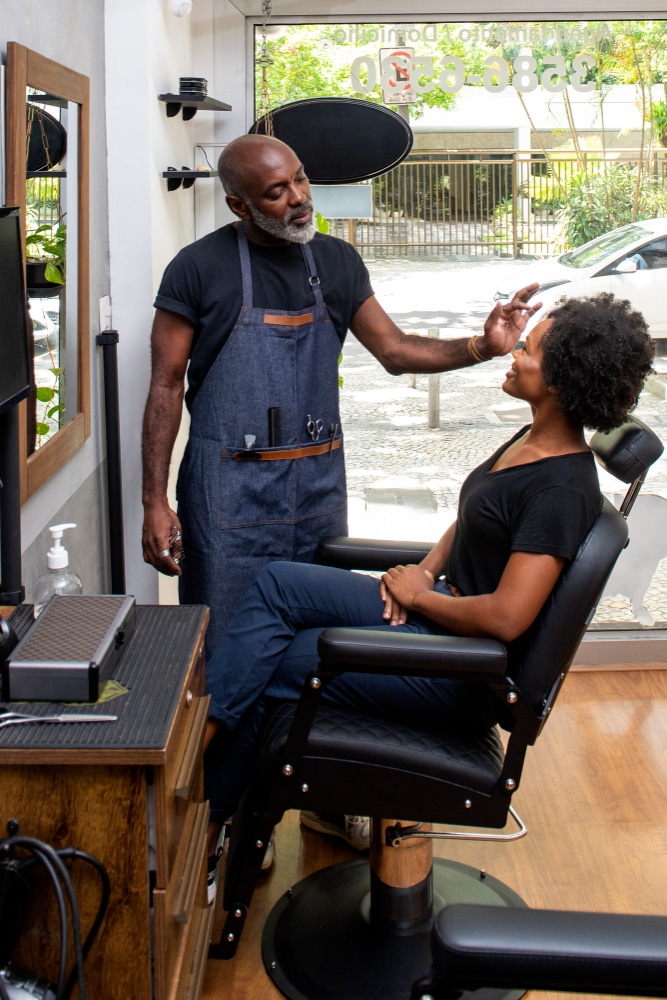
Why Starting a Salon is a Profitable Business
One of the main reasons starting a hair salon in Nigeria can be a profitable business is the sheer demand for hair care services. Hair salons in Nigeria provide services for both men and women, as well as children, with services ranging from haircuts and styling to braiding and hair treatments. This constant demand creates a consistent flow of potential customers and repeat business.
Also, hair salons have relatively low startup costs compared to other businesses, yet they can yield high returns. The hair care industry is not tied to a specific season or trend, making it less vulnerable to fluctuations in other sectors. People will always need to care for their hair, making it an evergreen business model that can remain profitable year-round.
Who Can Start a Hair Salon Business?
Anyone with a passion for hair care, an entrepreneurial mindset, and a willingness to learn can start a hair salon business in Nigeria. Whether you’re an experienced hairstylist, a recent graduate of a cosmetology program, or an individual with no prior experience, the beauty industry offers various entry points. While hairstyling experience can be helpful, it is not an absolute necessity to start a business.
In addition to knowing the passion and skills, you’ll need to be able to handle the operational aspects of running a business. This includes managing finances, marketing your salon, ensuring excellent customer service, and keeping up with trends. Whether you are an individual with a vision or a group of investors, the hair salon business in Nigeria provides ample opportunities for growth and success.
Related Posts:
- 30 Profitable Offline Service Business Ideas in Nigeria 2025.
- How to Start an Event Planning Business in Nigeria.
- How to Open a Car Wash Business in Nigeria.
- How to Make Money Tutoring in 7 Steps.
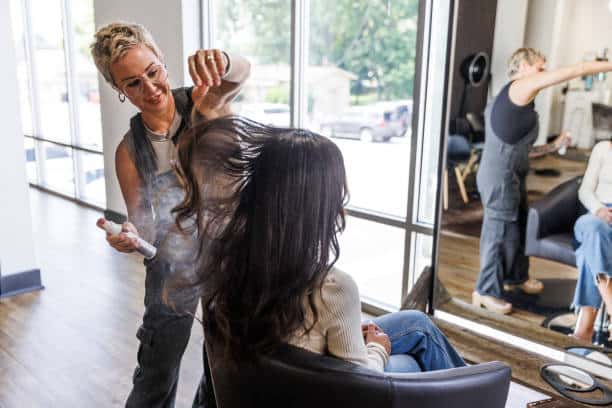
Here are the Steps on How to Start a Hair Salon Business in Nigeria
Step 1. Market Research and Business Planning
1. Understanding the Nigerian Hair Care Industry
Before opening a hair salon, is essential to understand the Nigerian hair care industry. This includes recognizing the types of services in demand, understanding the competition, and identifying emerging trends. Conducting thorough market research will allow you to tailor your salon services to meet local customer needs and preferences.
For instance, Nigeria has a rich cultural tradition of wearing braids, weaves, and natural hairstyles, which influences the types of services that are in high demand. Additionally, understanding the role of hair care in Nigerian weddings, celebrations, and other events will help you plan your services to target those specific occasions.
2. Identifying Your Target Customers
Understanding your target customer is one of the most important aspects of starting a hair salon business in Nigeria. Will your focus be on men, women, or children? Will you offer affordable services to a wider market? Identifying your target market early on will shape the way you set up your salon, choose your services, and determine your pricing strategy.
3. Analyzing Competition and Differentiating Your Salon
Analyzing competition is vital to ensure you stand out in a crowded market. Take note of other hair salons in your area: What services do they offer? What are their pricing structures? How can you differentiate your salon from theirs?
Differentiation can come in many forms, such as offering unique services like bridal hair styling, hair treatments, or VIP services, providing exceptional customer service, or creating a memorable brand experience. The more you know about your competitors, the better you’ll be able to position your salon to attract customers.
4. Creating a Business Plan
A solid business plan is the foundation of any successful business. When starting a hair salon in Nigeria, your business plan should include your salon’s mission statement, the services you intend to offer, an estimated budget, and a clear pricing strategy. Your business plan will guide your decision-making and ensure you stay focused on your goals.
Your mission statement should reflect your vision for the salon, while your services should serve your target market. Consider pricing that reflects your location and target customers. Additionally, plan your expenses (rent, utilities, salaries) and project your potential income to ensure the sustainability of your business.
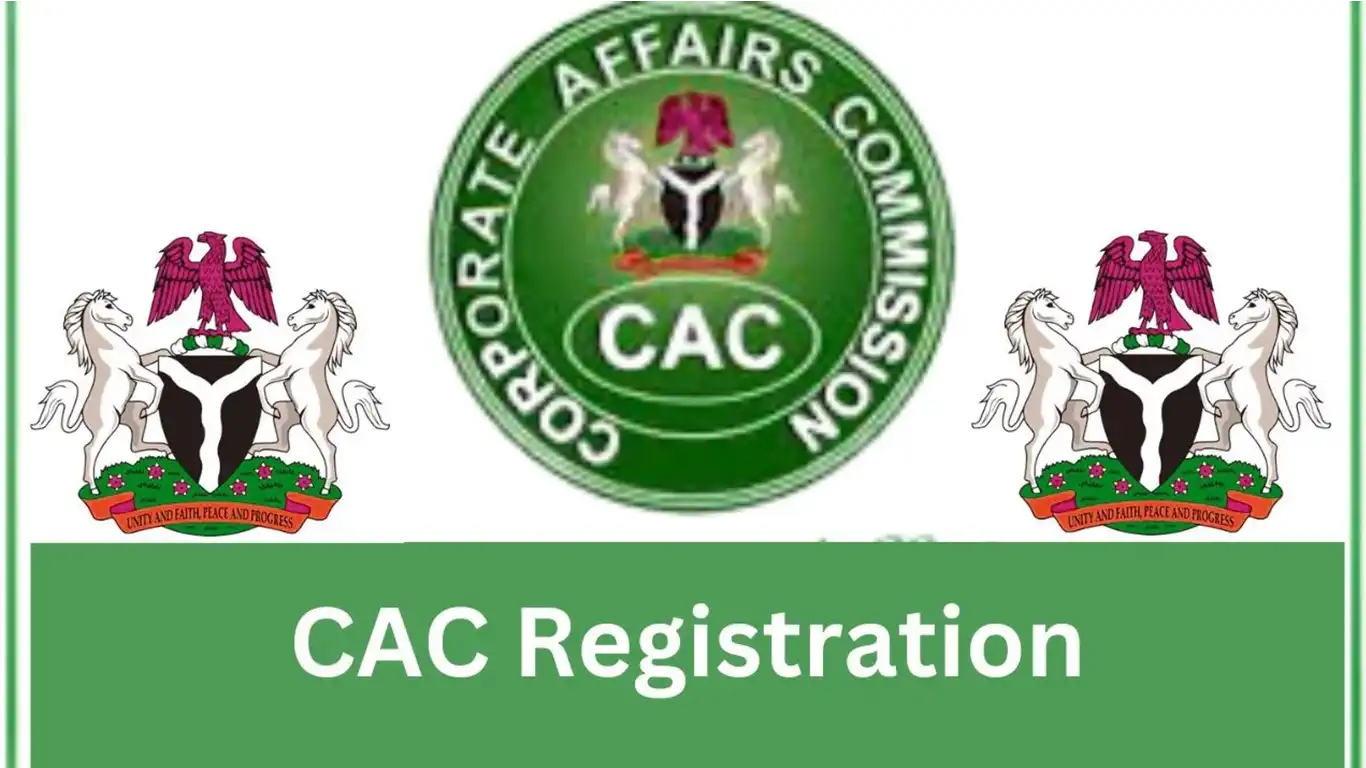
Step 2. Legal Requirements and Business Registration
1. Register Your Salon Business with CAC (Corporate Affairs Commission)
To legally operate your hair salon in Nigeria, you must register your business with the Corporate Affairs Commission (CAC). This process involves choosing a unique name for your salon, filling out the necessary documentation, and paying the required fees. Registration grants you legal protection and allows you to open business bank accounts, apply for loans, and operate as a legitimate entity.
2. Licenses and Permits Needed to Operate Legally
In addition to CAC registration, you may need additional licenses and permits to operate your hair salon. Depending on your location, this may include health and safety permits, environmental permits, or local government approvals. Ensure you understand the specific requirements for your area to avoid legal issues.
3. Understanding Tax and Compliance Regulations
As a business owner, it’s essential to understand your tax obligations. Nigeria’s tax system requires businesses to pay taxes on income, employee salaries, and other operational activities. Registering for the necessary tax identification numbers (TIN) and complying with the tax laws will keep your business in good standing with the authorities.
Step 3. Finding the Right Location for Your Salon
1. Factors to Consider: Foot Traffic, Accessibility, Target Market
The location of your salon is important to its success. Choose a location that is easily accessible to your target market, with high foot traffic and good visibility. Whether in a commercial area, residential neighborhood, or shopping mall, the right location can help you attract customers and grow your salon business.
2. Renting vs. Owning a Shop
When choosing a location, decide whether to rent or own your salon space. Renting is often the more affordable option, especially in the early stages of your business. However, owning the property can provide long-term financial benefits. Weigh the pros and cons of both options before making a decision.
3. How Location Impacts Pricing and Customer Base
Your location will also impact your pricing strategy. A salon located in an urban area with high foot traffic may charge higher prices, while one located in a more affordable neighborhood may need to keep prices lower to attract customers. Understanding your location’s market dynamics will help you set competitive pricing for your services.
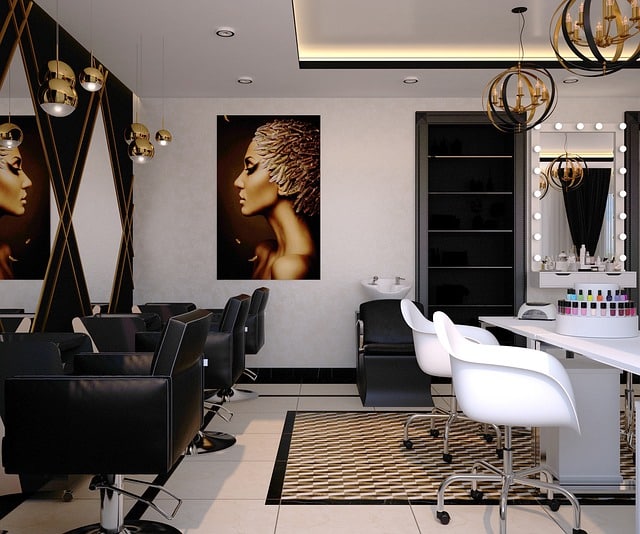
Step 4. Setting Up Your Salon Space
1. Salon Layout and Interior Design Ideas
Creating an inviting salon layout is key to attracting and retaining customers. Your salon space should reflect the type of services you offer and the experience you want to provide. A clean, well-organized salon with comfortable seating, proper lighting, and a relaxing atmosphere can enhance your customers’ experience.
2. Essential Furniture and Decor for a Professional Look
Invest in quality furniture, such as styling chairs, wash basins, and storage units. Your decor should also align with your brand and create a welcoming atmosphere. If you’re on a budget, you can find stylish, cost-effective options that still make a positive impression on your customers.
3. Cost-Effective Salon Setup Options for Beginners
As a beginner, you may need to prioritize essential items while keeping costs manageable. Look for second-hand equipment or budget-friendly furniture. By starting small and gradually upgrading your salon as your business grows, you can reduce initial expenses while still offering quality services.
Step 5. Equipment and Supplies Needed to Start a Salon
1. List of Must-Have Salon Tools (Dryers, Clippers, Styling Chairs, etc.)
When starting a hair salon in Nigeria, investing in quality tools and equipment is crucial for providing professional services. Here’s a list of essential salon equipment:
- Hair Dryers: Essential for styling and blow-drying hair.
- Hair Clippers: For cutting hair, particularly for men’s styles.
- Styling Chairs: Comfortable chairs for customers during haircuts or treatments.
- Wash Basins: Necessary for shampooing hair.
- Mirrors: Large mirrors allow both the stylist and the customer to see the work being done.
- Towels and Capes: Used for drying hair and protecting customers’ clothing during treatments.
- Hair Rollers: Used for creating curls and setting hair.
- Straighteners and Curling Irons: For styling and creating different hair textures.
- Combs, Brushes, and Sectioning Clips: Essential for all hairdressing activities.
- Storage Units: Cabinets or shelves for storing products, tools, and equipment.
- Sanitizing Equipment: To ensure hygiene and safety in your salon.
Investing in high-quality equipment is important as it helps in creating a professional image, offering superior services, and ensuring customer satisfaction.
2. Best Places to Buy Salon Equipment in Nigeria
There are numerous places in Nigeria where you can buy salon equipment, both online and offline. Some of the best options include:
- Jumia and Konga: Both of these online retailers offer a wide variety of salon equipment. You can compare prices and read reviews before making purchases.
- Beauty Equipment Stores: Local stores that specialize in beauty equipment are found in major cities like Lagos, Abuja, and Port Harcourt. These stores often have a wide selection of professional tools.
- Wholesale Suppliers: If you’re purchasing in bulk, consider sourcing your equipment from wholesale suppliers for discounts.
- Salon Equipment Importers: There are importers who specialize in sourcing high-quality salon equipment from international suppliers. This option may be more costly but can provide superior equipment.
Make sure to evaluate the quality of the equipment before purchasing and check for warranties or after-sales services.
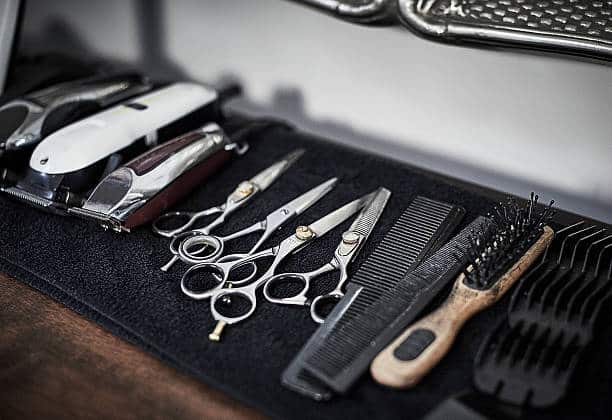
3. Choosing Quality Hair Care Products That Attract Customers
The products you use in your salon can make a significant impact on customer satisfaction and the success of your business. Choose hair care products that are well-known, safe, and effective. Consider using reputable brands of shampoo, conditioners, hair oils, and treatments. Products like those that serve natural hair, wigs, and extensions are particularly popular in Nigeria.
Some popular and trusted brands to consider are:
- ORS (Organic Root Stimulator)
- Shea Moisture
- Aunt Jackie’s
- Dark and Lovely
- TRESemmé
In addition to hair care products, you’ll also check the expiring date and NAFDAC number for each items. Offering the right mix of products for different hair types will attract more customers and encourage repeat visits.
Step 6. Hiring and Training Skilled Staff
1. How to Find Experienced Hairstylists and Barbers
A salon’s success is largely dependent on the skill and professionalism of its staff. To find experienced hairstylists and barbers, consider the following strategies:
A. Network: Attend beauty events, hair exhibitions, and networking events where hairstylists gather. Connecting with professionals in the industry can lead to discovering qualified staff.
B. Advertise: Use online platforms like Jobberman, Indeed Nigeria, or social media to advertise job openings. Be specific about the skills you require (e.g., experience with braiding, cutting, or styling).
C. Check Portfolios: Request portfolios or conduct trial sessions to assess the abilities of potential employees. It’s important to evaluate their practical skills before making any commitments.
D. Referrals: Ask other salon owners or industry professionals for recommendations. Word-of-mouth referrals are often a reliable source for finding talented staff.
2. Staff Salary Expectations for Your Employees
Salaries for hairstylists and barbers in Nigeria can vary depending on the location and level of expertise. On average:
A. Entry-Level Stylists: They typically earn between ₦20,000 to ₦50,000 per month.
B. Experienced Stylists: For those with several years of experience, salaries range between ₦60,000 and ₦80,000 per month.
C. Senior or Master Stylists: Highly experienced professionals can earn upwards of ₦100,000 per month, depending on the reputation of the salon and the location.
In addition to fixed salaries, many salons offer commission-based pay, where staff earn a percentage of the services they perform. This is a great way to motivate employees and increase their earnings potential.
3. Offering Training to Maintain High Service Quality
Even if you hire experienced staff, providing ongoing training is essential to ensure that the quality of your services remains high. Offer training programs that focus on new hair trends, customer service skills, and hygiene standards. Training helps maintain a consistent standard of service and keeps staff updated on the latest industry techniques.
You can organize training sessions within your salon or send staff to external workshops and courses for hands-on learning. Investing in training will ensure that your salon maintains its competitive edge and attracts more customers.
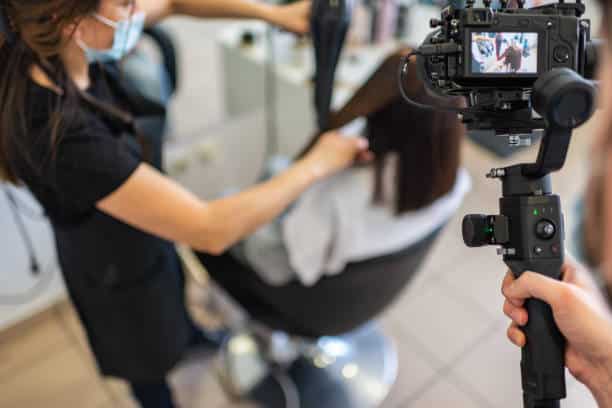
Step 7. Salon Marketing and Branding Strategies
1. Creating a Strong Brand Identity (Name, Logo, Slogan)
Branding is crucial for differentiating your salon and attracting customers. Your salon’s brand should reflect your target market and the kind of services you offer. Start by choosing a memorable name, designing a professional logo, and creating a catchy slogan that captures the essence of your salon.
For example, if you aim to target high-end customers, choose a name and logo that conveys style and luxury. If your salon is more affordable, the branding should reflect approachability and warmth.
2. Online Marketing: Social Media, Website, and Paid Ads
In today’s digital age, online marketing is essential for the growth of your salon business. Use platforms like Instagram, Facebook, and Twitter to post before-and-after photos of your work, advertise promotions, and engage with your audience. Consider creating a professional website with information about your services, pricing, and location.
Paid advertising on social media platforms can also help drive more traffic to your salon, particularly if you target local customers. Running Facebook or Instagram ads with specific targeting options can lead to increased visibility and customer bookings.
3. Offline Marketing: Word-of-Mouth, Flyers, and Local Networking
Offline marketing is equally important in building your customer base. Word-of-mouth referrals from happy customers are incredibly valuable in the salon industry. Encourage your clients to refer friends and family by offering referral discounts.
Distribute flyers, business cards, and promotional materials in local communities, shopping malls, and other areas with high foot traffic. Networking with local businesses or attending local events can also help spread the word about your salon.
Step 8. Pricing Strategy: How Much to Charge for Salon Services
1. Understanding Service Pricing Based on Location and Target Audience
Pricing your salon services correctly is essential for attracting customers and maintaining profitability. Consider the economic landscape in your location, the types of services offered, and the income levels of your target audience. Higher-end locations like Lagos Island and Abuja will allow for premium pricing, while more affordable areas may require competitive pricing to attract customers.
2. Common Pricing for Braiding, Styling, Cutting, and Other Services
Here is an example of typical pricing for common salon services in Nigeria based on my research (prices may vary depending on location):
- Haircuts: ₦500 to ₦2,000 (for men and women)
- Braids: ₦2,000 to ₦10,000 (depending on style and length)
- Hair Styling: ₦1,500 to ₦6,000
- Hair Treatment: ₦2,000 to ₦5,000
- Coloring: ₦3,000 to ₦10,000
- Hair Relaxing: ₦2,500 to ₦6,000
These prices can vary based on your location, target audience, and the skill level of your staff.
3. How to Offer Discounts and Promotions to Attract New Clients
Offering introductory discounts or promotional deals is an excellent way to attract new clients to your salon. For example, you can offer a 10% discount for first-time clients or provide bundled services at a discounted rate. Holiday promotions, seasonal sales, or birthday discounts are also effective ways to encourage customers to return and recommend your services to others.
Step 9. Customer Service and Retention Strategies
1. How to Attract and Retain Loyal Customers
Attracting and retaining customers is essential to the success of your hair salon business in Nigeria. Building strong relationships with your clients is the key to creating repeat business. Here are a few tips for ensuring customer loyalty:
A. Personalized Experience: Treat every customer like they are unique by remembering their preferences and modifying services to their specific needs. Personal touches, such as remembering a client’s name or favorite hairstyle, make them feel valued.
B. Consistent Quality Service: Ensure that each client receives a high standard of service every time they visit. Clients appreciate reliability and will return if they are satisfied with the service.
C. Time Management: Respecting your clients’ time is critical. Being punctual and minimizing wait times shows that you value your customers’ time, which can enhance their overall experience.
2. Importance of Customer Feedback and Satisfaction
Customer feedback is a powerful tool for improving your salon business. After providing a service, ask customers about their experience and if there’s anything you can improve. Use surveys, comment cards, or casual conversations to gather insights.
Clients who feel that their concerns are heard and addressed are more likely to return and recommend your services. Negative feedback should be taken seriously, as it presents an opportunity to correct mistakes and improve your service offerings.
Additionally, always express appreciation to customers for their feedback and show them that their opinions matter. Creating a culture of continuous improvement ensures that your salon stays relevant and customer-centric.
3. Creating a Referral Program for Client Growth
A referral program is a powerful way to attract new clients while rewarding your loyal customers. Offering incentives for customers who refer their friends or family members can help increase your salon’s customer base.
For example, you can offer a discount on the next service for both the referrer and the referred customer. Another option could be giving a free product or service after a certain number of successful referrals. Referral programs encourage word-of-mouth marketing, which is often more effective than any paid advertisement.
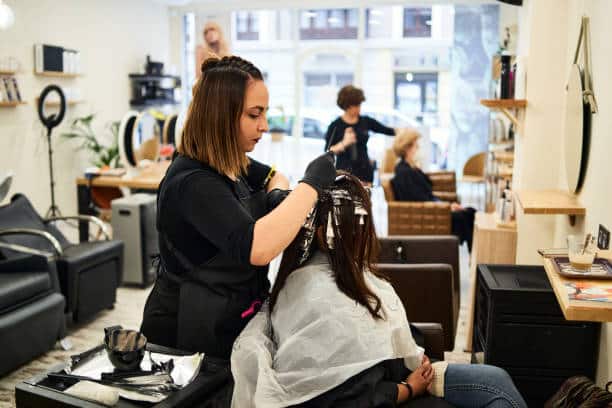
Step 10. Managing Finances and Scaling Your Salon Business
1. How Much Does It Cost to Start a Salon in Nigeria? (Budget Breakdown)
Starting a hair salon business in Nigeria can have varying costs, depending on the scale of the operation, location, and services offered. Below is a general budget breakdown for a medium-sized salon depending on my research:
A. Location: Renting a commercial space could cost anywhere between ₦100,000 and ₦500,000 per month, depending on the area.
B. Renovation and Interior Design: This may range from ₦200,000 to ₦2,000,000 depending on the level of design and the space you are working with.
C. Salon Equipment: A basic set of salon tools (chairs, dryers, clippers, etc.) could cost anywhere from ₦500,000 to ₦1,500,000.
D. Initial Stock of Products: Hair care products, including shampoos, conditioners, and styling products, may cost around ₦100,000 to ₦500,000 to start.
E. Staff Salaries: Initial salary expenses for hiring hairstylists, barbers, and support staff will likely total ₦100,000 to ₦500,000 per month.
F. Marketing and Branding: Branding, such as logo design, social media campaigns, and printed materials, could cost anywhere from ₦50,000 to ₦200,000.
The total estimated initial cost for starting a salon in Nigeria could range from ₦1,000,000 to ₦5,000,000, depending on the location and scale of your business. It is important to keep a contingency fund for unexpected expenses.
2. Managing Expenses and Maximizing Profit
Effective financial management is critical to the long-term success of your hair salon. You will need to keep track of all your expenses (rent, salaries, supplies, etc.) and revenue to ensure that your business remains profitable.
A. Keep a Detailed Budget: A comprehensive budget helps you understand where your money is going and where you can cut costs. Track expenses such as utilities, product purchases, wages, and marketing.
B. Control Inventory: Managing inventory and avoiding overstocking or understocking will help save costs. Ensure that you only purchase products you will regularly use.
C. Offer Additional Services: In addition to basic haircuts and styling, consider offering add-on services like scalp treatments, hair coloring, or hair extensions. This can increase your revenue per client.
D. Monitor Cash Flow: Cash flow is the lifeblood of your business. Make sure you consistently track your income and expenses to avoid running into financial issues.
Using accounting software or working with an accountant can help you keep track of the finances and ensure your salon is on a profitable path.
3. Expanding Your Salon: Opening Multiple Locations or Adding New Services
As your hair salon business grows, you may want to expand your operations. Some ways to scale your business include:
A. Opening Multiple Locations: If your first location is doing well, you can consider opening additional branches in other areas. This could significantly increase your market reach and revenue.
B. Adding New Services: Introduce new services like makeup, manicure/pedicure, or even a barbershop section for men to broaden your customer base and increase revenue.
C. Franchising: If you have a strong brand and operational system, franchising could be a way to expand quickly by allowing others to open salons under your brand name.
However, when scaling your business, ensure that your existing operations remain efficient and profitable. Growing too fast without proper management can lead to financial strain.
Common Mistakes to Avoid When Starting a Salon in Nigeria
1. Poor Financial Planning
Financial mismanagement is one of the top reasons businesses fail. Make sure you have a well-thought-out budget, track your expenses, and understand how much profit you need to make to stay afloat. Avoid overspending on non-essential items, especially in the beginning stages of your salon business.
2. Hiring Unqualified Staff
Your salon’s reputation depends heavily on the quality of service your staff provides. Avoid the mistake of hiring underqualified or inexperienced employees. Take time to assess candidates, verify their experience, and even conduct trial sessions to ensure they meet your standards.
3. Lack of Marketing and Branding Strategies
Many salon owners fail to invest in effective marketing, relying solely on word-of-mouth. While referrals are essential, you need to create a marketing strategy that includes both online and offline efforts. A strong brand and consistent marketing will help you build a loyal customer base and attract new clients.
4. Choosing the Wrong Location
Selecting the wrong location for your salon can hinder your business’s success. Avoid areas with low foot traffic, poor accessibility, or an irrelevant target audience. Take the time to research the location and consider factors like demographics and competition before signing any rental agreement.

Starting a Salon in Nigeria Frequently Ask Questions and Answers
1. How Much Capital is Needed to Start a Salon in Nigeria?
To start a hair salon business in Nigeria, you may need anywhere from ₦1,000,000 to ₦5,000,000, depending on the size, location, and services you offer.
2. Is a Salon Business Profitable in Nigeria?
Yes, a salon business can be highly profitable in Nigeria due to the high demand for hair care services and relatively low startup costs. However, profitability depends on location, competition, and the quality of services you provide.
3. Do I Need a Business License to Open a Salon?
Yes, you will need to register your salon with the Corporate Affairs Commission (CAC) and obtain any necessary local licenses and permits. Compliance with Nigerian tax laws is also essential.
Conclusion
Starting a hair salon business in Nigeria offers vast potential for growth and profitability. From conducting market research, understanding the legal requirements, hiring the right staff to set up your salon space, and creating a strong brand, every step is crucial to your success. Pricing your services competitively, offering exceptional customer service, and investing in marketing will help you stand out in a crowded market.
Opening a hair salon business in Nigeria is an exciting and rewarding journey. With careful planning, a clear vision, and a commitment to quality service, you can build a successful salon that meets the needs of your community. Remember to be patient, stay adaptable, and continuously learn from your experiences. The Nigerian beauty industry is full of opportunities, and with determination and the right strategies, your hair salon can thrive.
So good luck on your journey to becoming a successful salon owner in Nigeria!


